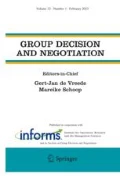Abstract
Drama theory differs from game theory in that it does not regard actors' preferences and perceived opportunities as fixed, but as capable of being changed by the actors themselves under the pressure of pre-play negotiations. Thus characters in a drama undergo change and development. A manyperson, multiphase theory of dramatic transformation is presented, showing how thecore of a drama (in the sense of game theory) is transformed by the interaction between the characters into a strict, strong equilibrium to which they all aspire. The process of dramatic transformation is shown to be driven by actors' reactions to various “paradoxes of rationality”; it is proved that when all these paradoxes have been overcome, a full dramatic resolution has been reached, satisfying actors' emotional and moral demands, as well as the demands of rationality.
Similar content being viewed by others
References
Aumann, R.J. (1959). “Acceptable Points in General Cooperativen-Person Games.” In A.W. Tucker and R.D. Luce (eds.),Annals of Mathematics Studies No. 4, Princeton, NJ, pp. 287–324.
Bennett, P.G. (1980). “Hypergames: Developing a Model of Conflict,”Futures 12, 489–507.
Howard, N. (1978) “Categories of Games,” unpublished.
Howard, N. (1990). “‘Soft’ Game Theory,”Information and Decision Technologies 16, 215–227.
Howard, N. et al. (1992). “Manifesto for a Theory of Drama and Irrational Choice,”Journal of the Operational Research Society.
Howard, N. (1992). “A Paradigm Shift,”Cooperation and Conflict 6(1), 1–2 (formerly theCONAN Newsletter, published by Nigel Howard Systems, 10 Bloomfield Rd., Birmingham, B13 9 BY, UK).
Howard, N. (1971).Paradoxes of Rationality: Theory of Metagames and Political Behavior. Cambridge, MA: MIT Press.
Nash, J.F. (1953). “Two-Person Cooperative Games,”Econometrica 21, 128–140.
Pirandello, L. (1924).Six Characters in Search of an Author. Translated by E. Storer in Eric Bentley (ed.),Naked Masks, Five Plays by Luigi Pirandello (1952). New York.
von Neumann, J. (1939). “On the Theory of Games of Strategy.” Translated and reprinted in A. W. Tucker and R.D. Luce (eds.),Annals of Mathematics Studies No. 4, Princeton, NJ (1959), pp. 13–42.
Author information
Authors and Affiliations
Rights and permissions
About this article
Cite this article
Howard, N. Drama theory and its relation to game theory. Part 1: Dramatic resolution vs. Rational solution. Group Decis Negot 3, 187–206 (1994). https://doi.org/10.1007/BF01384354
Issue Date:
DOI: https://doi.org/10.1007/BF01384354



